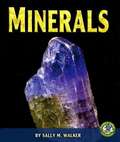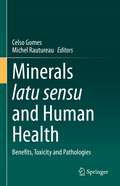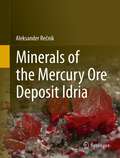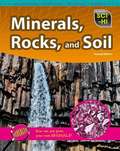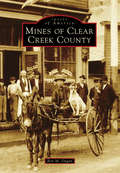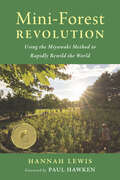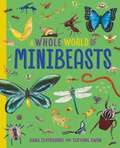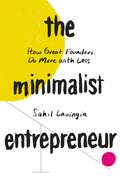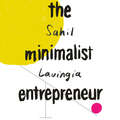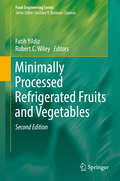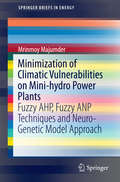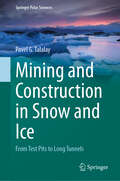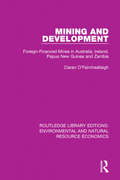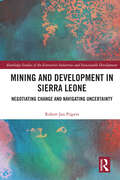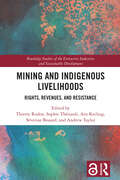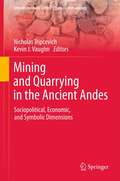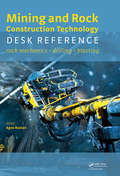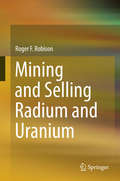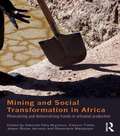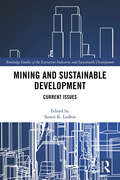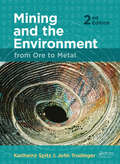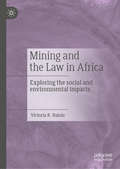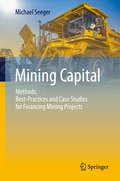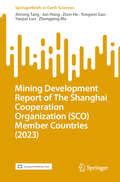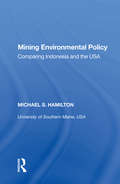- Table View
- List View
Minerals (Early Bird Earth Science)
by Sally M. WalkerA mineral is a substance found in nature. Minerals are solid. They are not alive, like plants and animals are. Earth has more than 3,500 different kinds of minerals.
Minerals latu sensu and Human Health: Benefits, Toxicity and Pathologies
by Celso Gomes Michel RautureauThis volume provides a comprehensive academic review of both positive and negative effects of minerals on human health and quality of life. The book adopts the concept of mineral latu sensu (mineral l.s.), which encompasses a broad spectrum of natural, inorganic, solid, and crystalline, of natural and inorganic chemical elements (metals and metalloids), of modified natural minerals, of biominerals, and of syntetic minerals, all products that branch across the disciplines of earth, soil, environmental, materials, nutrition, and health sciences. Using this broad framework, the authors are able to provide a multidisciplinary assessment on many types of minerals which can be essential, beneficial and hazardous to human health, covering applications in medical geology, medical hydrology or balneotherapy, pharmacology, chemistry, nutrition, and biophysics. The book performs historical analyses of the uses of minerals for therapeutic and cosmetic purposes to better understand current trends and developments in mineral research and human health. The book will be of interest to students, public health officials, environmental agencies and researchers from various disciplines, as well as scientific societies and organizations focusing on medical geology, health resort medicine (crenotherapy, hydrotherapy and climatotherapy), and on pharmaceutical, cosmetic and biomedical applications.
Minerals of the mercury ore deposit Idria
by Aleksander RecnikThe present work is the first comprehensive study of mineralogy of the world's second largest mercury mine Idria. In the first chapter the readers are acquainted with the history of mining and its relation to mineralogy. Mineralogy is explained in terms of geological processes that were active during the formation of the ore deposit. Among these, hydrocarbons present in the host rocks play a very important role during crystallization. The central part of the book is dedicated to the main mineral of the ore deposit, cinnabar. It occurs in a variety of crystal forms, of which the most special are lateral interpenetration twins. The book is written for a broad readership, and will be interesting for geologists, mineralogist and crystallographers, as well as for those interested in the history of mineral collecting in Idria.
Minerals, Rocks, and Soil (Sci-Hi: Earth and Space Science)
by Barbara Davis‘Minerals, Rocks, and Soil’ shows you how minerals, soil, and rocks form. You will learn where minerals can be found and how to identify them. You will find out all about the different types of rocks and what they can be used for. You will discover which types of soil are best for plants to grow in. So, come on a fantastic journey into the world of minerals, rocks, and soil! Sci-Hi is an engaging, comprehensive, and visually stimulating series that takes learning science core curriculum to a whole new level!
Mines of Clear Creek County
by Ben M. DuganIn 1859, "Pikes Peak or bust!" spread across America and brought men and their families from all over to the Kansas goldfields seeking a new beginning. Thousands came to Clear Creek and Gilpin Counties and eventually settled all of Colorado. The mining communities of Idaho Springs, Georgetown, Empire, Silver Plume, Dumont, and Lawson all exist because of the pursuit of gold and silver. Gold was initially easy to get to, but in time, underground mineral development was necessary. New technologies and the Industrial Revolution made mining easier, but there was still work to be done to establish local fire departments, churches, schools, and governments.
Mini-Forest Revolution: Using the Miyawaki Method to Rapidly Rewild the World
by null Hannah Lewis*2023 Nautilus Book Award Gold Medal Winner: Green, Restorative Practices /Sustainability&“Hannah Lewis describes a gift to a despairing world. . . . There may be no single climate solution that has a greater breadth of benefits than mini-forests. . . [and] can be done by everyone everywhere.&”—Paul Hawken, from the forewordFor readers who enjoyed Finding the Mother Tree and The Hidden Life of Trees comes the first-ever book about a movement to restore biodiversity in our cities and towns by transforming empty lots, backyards, and degraded land into mini-forests. Author Hannah Lewis is the forest maker turning asphalt into ecosystems to save the planet and she wants everyone to know they can do it too.In Mini-Forest Revolution, Lewis presents the Miyawaki Method, a unique approach to reforestation devised by Japanese botanist Akira Miyawaki. She explains how tiny forests as small as six parking spaces grow quickly and are much more biodiverse than those planted by conventional methods. She explores the science behind why Miyawaki-style mini-forests work and the myriad environmental benefits, including: cooling urban heat islands, establishing wildlife corridors, building soil health, sequestering carbon, creating pollinator habitats, and more.Today, the Miyawaki Method is witnessing a worldwide surge in popularity. Lewis shares the stories of mini-forests that have sprung up across the globe and the people who are planting them―from a young forest along the concrete alley of the Beirut River in Lebanon, to a backyard forest planted by tiny-forest champion Shubhendu Sharma in India.This inspiring book offers a revolutionary approach to planting trees and a truly accessible solution to the climate crisis that can be implemented by communities, classrooms, cities, clubs, and families everywhere. &“Lewis simplifies the science of planting trees in a manner that produces the maximum benefit.&”—The Associated Press
Minibeasts (A Whole World of... #3)
by Anna ClaybourneGet lost in the diverse and bustling world of minibeasts - with more to explore than you ever imagined!A Whole World of Minibeasts presents the stunning breadth of minibeast varieties that roam Earth, including everything from insects to arachnids, slugs, snails and worms to millipedes and teeny, tiny tardigrades. Who is related to whom? Which type swim or fly or hop? Which have the coolest camouflage, and which have the most legs (over 1,000!)? This book has the answers and so many more facts filling the beautifully illustrated pages.A Whole World of is a book series looking at the extraordinary diversity of life on Earth - the defining features and evolutionary branches - and encourages readers age 7 and up to consider why it is important to maintain biodiversity. Written by award-winning author, Anna Claybourne, with artwork by award-winning illustrator, Yekyung Kwon.Books in the series:A Whole World of Mammals/A Whole World of Prehistoric Life/A Whole World of Minibeasts/A Whole World of Birds/A Whole World of Rocks and Minerals/A Whole World of Plants and Fungi
The Minimalist Entrepreneur: How Great Founders Do More with Less
by Sahil Lavingia'Pay attention' - Jason Fried, founder and CEO of Basecamp, bestselling author of ReWork A revolutionary roadmap for building startups that go the distance Cracks are forming in the myth of the VC-funded, IPO-driven billion-dollar company. They're unprofitable, unethical and unsustainable - so why bother chasing unicorns? The Minimalist Entrepreneur is the manifesto for a new generation of founders who would rather build great companies than big ones. Packed with hard-won, battle-tested lessons from Lavingia's own journey of building Gumroad, The Minimalist Entrepreneur teaches founders how to start from anywhere to build any kind of software-enabled business. You will learn how to: resist investments that set you up to fail; run a tight ship amid the rise of the gig economy and remote work; develop and release products without failing fast or often; get to profitability and stay there. The Minimalist Entrepreneur offers essential knowledge for every founder aspiring to build a business worth building.
The Minimalist Entrepreneur: How Great Founders Do More with Less
by Sahil Lavingia'Pay attention' - Jason Fried, founder and CEO of Basecamp, bestselling author of ReWork A revolutionary roadmap for building startups that go the distance Cracks are forming in the myth of the VC-funded, IPO-driven billion-dollar company. They're unprofitable, unethical and unsustainable - so why bother chasing unicorns? The Minimalist Entrepreneur is the manifesto for a new generation of founders who would rather build great companies than big ones. Packed with hard-won, battle-tested lessons from Lavingia's own journey of building Gumroad, The Minimalist Entrepreneur teaches founders how to start from anywhere to build any kind of software-enabled business. You will learn how to: resist investments that set you up to fail; run a tight ship amid the rise of the gig economy and remote work; develop and release products without failing fast or often; get to profitability and stay there. The Minimalist Entrepreneur offers essential knowledge for every founder aspiring to build a business worth building.
Minimally Processed Refrigerated Fruits and Vegetables
by Fatih Yildiz Robert C. WileyThe first edition of Minimally Processed and Refrigerated Fruits and Vegetables, edited by Robert C. Wiley and Fatih Yildiz, was published in 1994. At the time of publication, this was a new concept and was well-received by the scientific community. Minimally processed foods are whole plant tissues (the identity of the plant tissue is recognized by consumers), which may contain active enzymes, live tissues, and plant cells. These are some of the basics for the healthy food design. The overall function of these foods is to provide convenient (ready-to-serve, ready-to cook, free of any pesticides and contaminants),like-fresh products for food service and retail consumers. Minimally Processed and Refrigerated Foods (MPR) have been popular in many countries. The following are some of the advantages offered by MPR produce foods: 1. Ease of portion control in the food service industry 2. Lower transportation cost (all inedible portions of the produce are removed prior to transportation) 3. No waste is generated at the point of consumption 4. Utilization and recycling of the waste is much easier 5. Value-added new fruit and vegetable products and meal development is possible and easy 6. No requirement is needed for phytosanitary control during trade 7-No glycation end products formation during processing, 8. Degree of food processing is minimized for optimal health of human, the processing plant for MPR produce, which is not addressed in any other books on this topic, will be described in this second edition. Also, comparison of minimal processing technologies with other technologies was explained in the first publication and will be updated in this second edition. During the last 200 years the purpose of food processing was a-safety(sterilization, Pasteurization,1804 Nicholas Apert,Pasteur 1867), and b-prevention of deficiency diseases(Enrichments),but MPR foods provides a two new dimensions to food processing ; a-Prevention of chronic diseases(bioactive compounds) and b-Optimum health (functional foods,Superfoods,Neutraceuticals, and Medical foods) for human.
Minimization of Climatic Vulnerabilities on Mini-hydro Power Plants
by Mrinmoy MajumderThis Brief presents the multi criteria decision making (MCDM) techniques like Fuzzy Analytical Hierarchy Process (AHP) and Fuzzy Analytical Network Process (ANP) to find out the importance of the influencing factors to develop the Climatic Vulnerability Index (CVI) that will represent the vulnerability of the Hydro-Power Plant (HPP) to climatic abnormalities. The cognitive ability of neuro-genetic modeling is applied to minimize CVI so that the conditions required to reduce the effect of climate change on HPP can be identified. The results from the study are found to be encouraging. The scarcity and pollution potential of conventional sources of energy has enforced scientists worldwide to look for efficient, flexible, cost effective but reliable alternative energy resources. Among many available options the energy extracted from water was found to be the least expensive, most flexible and moderately reliable renewable energy source which has the potential to replace the dependency on conventional fuels.
Mining and Construction in Snow and Ice: From Test Pits to Long Tunnels (Springer Polar Sciences)
by Pavel G. TalalaySnow, firn, and ice are the most widespread cryogenic minerals on Earth’s surface. Their properties differ significantly from those of common minerals, and their excavation requires special approaches. The problems of mining and construction in snow and ice could be explained mostly by harsh climate conditions, logistics difficulties, environmental issues and snow-ice related challenges. The primary objective of this book is to list all feasible technologies for mining and construction in snow and ice, and to analyze these from the perspective of applications, problems, and hindrances. Although mining and construction in snow and ice appears exotic, it is significantly common for the production of snow and ice as a source of freshwater and construction material; accessing subglacial ore; the investigation and sampling of near-surface layers; glacier geoengineering works; recovering of snow-buried objects; construction of subsurface shelters for living, working, and military facilities; observation and investigation of glacier beds; construction of sightseeing ice tunnels; and drainage of ice-dammed proglacial lakes.
Mining and Development: Foreign-Financed Mines in Australia, Ireland, Papua New Guinea and Zambia (Routledge Library Editions: Environmental and Natural Resource Economics)
by Ciaran O'FaircheallaighThis book, first published in 1984, examines the economics and political issues raised by foreign investment in mineral development. It is an attempt to identify, as far as possible, what occurs in and between countries when foreign investments are made in mineral development, concentrating on two main themes: on the nature of the transactions which constitute the process of foreign investment on the physical level – money and instruments of credit, objects, information and people as they cross national boundaries – and on the nature of the relationships which are created between foreign investors and governments in the countries where the investments are made. The author argues that the nature of physical transactions plays a crucial role in determining the character of host country-foreign investor relations, and the policies and attitudes adopted by host country authorities exercise an important influence, in turn, on the physical effects of foreign investments. As such, the book constitutes a comprehensive overview of the economic and political factors involved in mining and its development.
Mining and Development in Sierra Leone: Negotiating Change and Navigating Uncertainty (Routledge Studies of the Extractive Industries and Sustainable Development)
by Robert Jan PijpersMining and Development in Sierra Leone examines how different actors in Sierra Leone use the effects of large-scale mining to navigate and transform the challenging conditions of life. The book offers an in-depth analysis of the processes of development and change that mark resource extraction environments globally. Across the world, resource extraction is assigned an important role in development agendas. Yet a key question is how development opportunities are given shape and accessed and how extraction’s negative impacts are dealt with in actual politics and practices. Set in the Northern Province of Sierra Leone during a global mining boom, this book shows how mining-cum-development’s multifaceted effects materialize. By taking the micro-politics of large-scale mining as its principal focus, the book analyzes a range of the most perplexing phenomena of life in Sierra Leone and scrutinizes the intricate and contentious processes of change unfolding in mining environments. Mining and Development in Sierra Leone goes beyond promise-or-problem dichotomies, offers key insights into the struggle for progress that characterizes the mining-development nexus, and provides innovative understandings of the resourceful ways in which different actors negotiate change and navigate uncertainty. This book will be of interest to students and scholars working on resource extraction, large-scale investments, globalization, and development, as well as to development practitioners, mining professionals, and policymakers.
Mining and Indigenous Livelihoods: Rights, Revenues, and Resistance (Routledge Studies of the Extractive Industries and Sustainable Development)
by Andrew Taylor Sophie Thériault Thierry Rodon Arn Keeling Séverine BouardThis book maps the encounters between Indigenous Peoples and local communities with mining companies in various postcolonial contexts.Combining comparative and multidisciplinary analysis, the contributors to this volume shine a light on how the mining industry might adapt its practices to the political and legal contexts where they operate. Understanding these processes and how communities respond to these encounters is critical to documenting where and how encounters with mining may benefit or negatively impact Indigenous Peoples. The experiences and reflections shared by Indigenous and non-Indigenous contributors will enhance our understanding of evolving practices and of the different strategies and discourses developed by Indigenous Peoples to deal with mining projects. By mobilizing in-depth fieldwork in five regions—Australia, Canada, Sweden, New Caledonia, and Brazil—this body of work highlights voices often marginalized in mining development studies, including those of Indigenous Peoples and women.This book will be of great interest to students and scholars of mining and the extractive industries, sustainable development, natural resource management, and Indigenous Peoples.The Open Access version of this book, available at http://www.taylorfrancis.com, has been made available under a Creative Commons Attribution-Non Commercial-No Derivatives (CC-BY-NC-ND) 4.0 license.
Mining and Quarrying in the Ancient Andes
by Kevin J. Vaughn Nicholas TripcevichOver the millennia, from stone tools among early foragers to clays to prized metals and mineral pigments used by later groups, mineral resources have had a pronounced role in the Andean world. Archaeologists have used a variety of analytical techniques on the materials that ancient peoples procured from the earth. What these materials all have in common is that they originated in a mine or quarry. Despite their importance, comparative analysis between these archaeological sites and features has been exceptionally rare, and even more so for the Andes. Mining and Quarrying in the Ancient Andes focuses on archaeological research at primary deposits of minerals extracted through mining or quarrying in the Andean region. While mining often begins with an economic need, it has important social, political, and ritual dimensions as well. The contributions in this volume place evidence of primary extraction activities within the larger cultural context in which they occurred. This important contribution to the interdisciplinary literature presents research and analysis on the mining and quarrying of various materials throughout the region and through time. Thus, rather than focusing on one material type or one specific site, Mining and Quarrying in the Ancient Andes incorporates a variety of all the aspects of mining, by focusing on the physical, social, and ritual aspects of procuring materials from the earth in the Andean past.
Mining and Rock Construction Technology Desk Reference: Rock Mechanics, Drilling & Blasting
by Agne RustanA comprehensive and illustrated desk reference with terms, definitions, explanations, abbreviations, trade names, quantifications, units and symbols used in rock mechanics, drilling and blasting. Now including rock mechanics as well, this updated edition presents 5127 terms, 637 symbols, 507 references, 236 acronyms, 108 formulas, 68 figures, 47 ta
Mining and Selling Radium and Uranium
by Roger F. RobisonPresented here is the story of the mining and sale of uranium and radium ore through biographical vignettes, chemistry, physics, geology, geography, occupational health, medical utilization, environmental safety and industrial history. Included are the people and places involved over the course of over 90 years of interconnected mining and sale of radium and uranium, finally ending in 1991 with the abandonment of radium paint and medical devices, Soviet nuclear parity, and the Radiation Exposure Compensation Act.
Mining and Social Transformation in Africa: Mineralizing and Democratizing Trends in Artisanal Production (Routledge Studies in Development and Society)
by Deborah Fahy Bryceson Eleanor Fisher Jesper Bosse Jønsson Rosemarie MwaipopoAfter more than three decades of economic malaise, many African countries are experiencing an upsurge in their economic fortunes linked to the booming international market for minerals. Spurred by the shrinking viability of peasant agriculture, rural dwellers have been engaged in a massive search for alternative livelihoods, one of the most lucrative being artisanal mining. While an expanding literature has documented the economic expansion of artisanal mining, this book is the first to probe its societal impact, demonstrating that artisanal mining has the potential to be far more democratic and emancipating than preceding modes. Delineating the paradoxes of artisanal miners working alongside the expansion of large-scale mining investment in Africa, Mining and Social Transformation in Africa concentrates on the Tanzanian experience. Written by authors with fresh research insights, focus is placed on how artisanal mining is configured in relation to local, regional and national mining investments and social class differentiation. The work lives and associated lifestyles of miners and residents of mining settlements are brought to the fore, asking where this historical interlude is taking them and their communities in the future. The question of value transfers out of the artisanal mining sector, value capture by elites and changing configurations of gender, age and class differentiation, all arise.
Mining and Sustainable Development: Current Issues (Routledge Studies of the Extractive Industries and Sustainable Development)
by Sumit. K. LodhiaMining is a transformative activity which has numerous economic, social and environmental impacts. These impacts can be both positive and adverse, enhancing as well as disrupting economies, ecosystems and communities. The extractive industries have been criticised heavily for their adverse impacts and involvement in significant social and environmental scandals. More recently, these industries have sought to respond to negative perceptions and have embraced the core principles of sustainability. This sector could be regarded as a leader in sustainability initiatives, evident from the various developments and frameworks in mining and sustainability that have emerged over time. This book reviews current topical issues in mining and sustainable development. It addresses the changing role of minerals in society, the social acceptance of mining, due diligence in the mining industry, critical and contemporary debates such as mining and indigenous peoples and transit worker accommodation, corporate sustainability matters such as sustainability reporting and taxation, and sustainability solutions through an emphasis on renewable energy and shared-used infrastructure. Written by experts from Australia, Europe and North America, but including examples from both developed and developing countries, the chapters provide a contemporary understanding of sustainability opportunities and challenges in the mining industry. The book will be of interest to practitioners, government and civil society as well as scholars and students with interests in mining and sustainable development.
Mining and the Environment: From Ore to Metal
by Karlheinz Spitz John TrudingerThe history of mining is replete with controversy of which much is related to environmental damage and consequent community outrage. Over recent decades, this has led to increased pressure to improve the environmental and social performance of mining operations, particularly in developing countries. The industry has responded by embracing the ideals of sustainability and corporate social responsibility. Mining and the Environment identifies and discusses the wide range of social and environmental issues pertaining to mining, with particular reference to mining in developing countries, from where many of the project examples and case studies have been selected. Following an introductory overview of pressing issues, the book illustrates how environmental and social impact assessment, such as defined in "The Equator Principles", integrates with the mining lifecycle and how environmental and social management aims to eliminate the negative and accentuate the positive mining impacts. Practical approaches are provided for managing issues ranging from land acquisition and resettlement of Indigenous peoples, to the technical aspects of acid rock drainage and mine waste management. Moreover, thorough analyses of ways and means of sharing non-transitory mining benefits with host communities are presented to allow mining to provide sustainable benefits for the affected communities. This second edition of Mining and the Environment includes new chapters on Health Impact Assessment, Biodiversity and Gender Issues, all of which have become more important since the first edition appeared a decade ago. The wide coverage of issues and the many real-life case studies make this practice-oriented book a reference and key reading. It is intended for environmental consultants, engineers, regulators and operators in the field and for students to use as a course textbook. As much of the matter applies to the extractive industries as a whole, it will also serve environmental professionals in the oil and gas industries. Karlheinz Spitz and John Trudinger both have multiple years of experience in the assessment of mining projects around the world. The combination of their expertise and knowledge about social, economic, and environmental performance of mining and mine waste management has resulted in this in-depth coverage of the requirements for responsible and sustainable mining.
Mining and the Law in Africa: Exploring the social and environmental impacts
by Victoria R. NaluleThe mining sector has been an integral part of economic development in many African countries. Although minerals have been exploited for decades in these countries, the benefits have not always been as visible. This has necessitated reforms including nationalisation of mining activities in the distant past; and currently legal and regulatory reforms. This book gives an insight of these reforms and with reference to the fieldwork research undertaken by the author in some African countries, the book highlights the social and environmental impacts of mining activities in Africa. The central question of the book is, why the mining laws have worked in some countries but not others and what can be done to ensure that these laws are effective? Consequently, the book analyses the legal reforms made in the sector and highlights both the challenges and the opportunities for foreign investors as well as the African governments and local communities. The book will be of great interest to researchers and students in Energy and Geography related fields, as well as to practitioners and policy makers.
Mining Capital: Methods, Best-Practices and Case Studies for Financing Mining Projects
by Michael SeegerMining is a capital-intensive industry, and involves long lead times to develop projects that demand a structured approach, from mine exploration to exit. This book provides mine developers, investors, owners, shareholders, and mineral policymakers a comprehensive game plan to raise capital for the development of new mining projects or to bolster operational mines. The author, an experienced mining capital consultant, shows how mine developers and mine owners can secure capital in any phase of the commodity price cycle, at any site, and at any project stage. The book follows a proven and structured approach that enables mine developers and owners to successfully raise capital for their projects. With the aid of case studies and practical methods, the reader will learn the essentials on topics ranging from developing and marketing a business case for investment, to the types and sources of mining capital for different project stages, as well as the structure and significance of due diligence. The author presents actual mining projects and their funding plans, transaction structures and term sheets for capital. The mining projects discussed represent various project stages, commodities, and parts of the globe, offering a comprehensive reference guide for mine developers, investors and promoters alike.
Mining Development Report of The Shanghai Cooperation Organization (SpringerBriefs in Earth Sciences)
by Jun Hong Jinrong Tang Zixin He Yongwei Gao Yanjun Luo Zhongping MaThis is the first research report on mining development in the SCO member countries conducted by a Chinese research institute. It focuses on the economic development, mineral resources endowment and current status of mining development, mining investment environment, and cooperation in geosciences and mining industry between China and other SCO member countries. The aim of this book is to promote the practical cooperation in geoscience and mining in the SCO and to build a closer community of destiny for the development of mining industry in the SCO. The translation was done with the help of artificial intelligence. The present version has been revised technically and linguistically by the authors in collaboration with a professional translator.
Mining Environmental Policy: Comparing Indonesia and the USA (Ashgate Studies In Environmental Policy And Practice)
by Michael S. HamiltonIllustrated by a detailed comparative examination of mining regulations and environmental impact assessment (EIA) in the USA (the second largest producer of coal in the world) and Indonesia (the eighth largest and most rapidly growing), this book argues that the degree of policy integration often determines the success or failure in controlling environmental effects of mining operations. Comparison of surface mining regulation in the two countries provides some stark contrasts, some surprising results concerning the diffusion of policy innovations from one country to another, and instances of both policy success and failure. The book provides significant new insights into international relations and comparative environmental policy, particularly as they affect rainforests and biodiversity. It also suggests that if mining environmental policy were to be effectively implemented, the environmental degradation caused need not be permanent.
